Connect With Us
Blog
Gout Pain Can Be Managed
What to Do About Foot Blisters
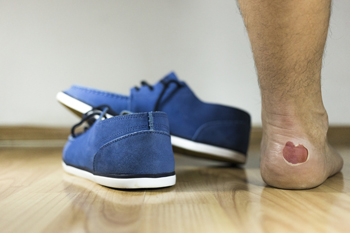
Foot blisters are small pockets of fluid that form on the skin due to friction, heat, or moisture. They often appear after wearing new or tight shoes, walking long distances, or when feet get sweaty and rub against socks. A blister may feel sore, look swollen, and have clear fluid inside. It is best not to pop a blister, as the skin protects the area underneath from infection. Instead, keep it clean, dry, and covered with a soft bandage. Using blister pads can help reduce pressure while it heals. Wearing well-fitting shoes and moisture-wicking socks can help prevent future blisters. If a blister breaks, gently clean the area and apply an antibiotic ointment. If a blister becomes red, warm, or filled with pus, it could be infected. If your blister is painful or does not heal properly, it is suggested that you see a podiatrist for safe and effective treatment.
Blisters may appear as a single bubble or in a cluster. They can cause a lot of pain and may be filled with pus, blood, or watery serum. If your feet are hurting, contact one of our podiatrists of The Podiatry Center, PC. Our doctors can provide the care you need to keep you pain-free and on your feet.
Foot Blisters
Foot blisters are often the result of friction. This happens due to the constant rubbing from shoes, which can lead to pain.
What Are Foot Blisters?
A foot blister is a small fluid-filled pocket that forms on the upper-most layer of the skin. Blisters are filled with clear fluid and can lead to blood drainage or pus if the area becomes infected.
Symptoms
(Blister symptoms may vary depending on what is causing them)
- Bubble of skin filled with fluid
- Redness
- Moderate to severe pain
- Itching
Prevention & Treatment
In order to prevent blisters, you should be sure to wear comfortable shoes with socks that cushion your feet and absorb sweat. Breaking a blister open may increase your chances of developing an infection. However, if your blister breaks, you should wash the area with soap and water immediately and then apply a bandage to the affected area. If your blisters cause severe pain it is important that you call your podiatrist right away.
If you have any questions, please feel free to contact our office located in Millburn, NJ . We offer the newest diagnostic and treatment technologies for all your foot care needs.
Common Causes of Sore Feet

Sore feet can stem from many causes related to overuse, excessive pressure, or inflammation. Long hours of standing, especially without movement, can lead to poor circulation and fatigue in the feet. Wearing shoes that lack proper support or high heels may put extra strain on the heel bone, arch, or forefoot, leading to pain. Physical activity, such as running or walking long distances, may cause soreness in the feet due to stress on the muscles, tendons, and joints. Your foot’s structure also plays a role, as people with flat feet, bunions, or abnormal gait patterns may experience ongoing discomfort. Gout, an inflammatory condition, can lead to sharp foot pain, especially in the big toe. A podiatrist can identify the cause of your foot pain and provide appropriate treatment. If your feet are sore on a regular basis, it is suggested that you schedule an appointment with a podiatrist for an exam, diagnosis, and treatment.
Foot Pain
Foot pain can be extremely painful and debilitating. If you have a foot pain, consult with one of our podiatrists from The Podiatry Center, PC. Our doctors will assess your condition and provide you with quality foot and ankle treatment.
Causes
Foot pain is a very broad condition that could be caused by one or more ailments. The most common include:
- Bunions
- Hammertoes
- Plantar Fasciitis
- Bone Spurs
- Corns
- Tarsal Tunnel Syndrome
- Ingrown Toenails
- Arthritis (such as Gout, Rheumatoid, and Osteoarthritis)
- Flat Feet
- Injury (from stress fractures, broken toe, foot, ankle, Achilles tendon ruptures, and sprains)
- And more
Diagnosis
To figure out the cause of foot pain, podiatrists utilize several different methods. This can range from simple visual inspections and sensation tests to X-rays and MRI scans. Prior medical history, family medical history, and any recent physical traumatic events will all be taken into consideration for a proper diagnosis.
Treatment
Treatment depends upon the cause of the foot pain. Whether it is resting, staying off the foot, or having surgery; podiatrists have a number of treatment options available for foot pain.
If you have any questions, please feel free to contact our office located in Millburn, NJ . We offer the newest diagnostic and treatment technologies for all your foot care needs.
Are Bunions Affecting Your Everyday Life?
Understanding Sever's Disease in Growing Feet

Sever's disease is a common cause of heel pain in children and young teens, especially those who participate in sports. It is not actually a disease but a growth-related condition that affects the heel’s growth plate. As the foot grows, the Achilles tendon can pull on the developing heel bone, causing pain and swelling. Running and jumping often make it worse, and the heel may feel sore to the touch. The pain usually comes and goes, and may be more noticeable after activity. Rest and stretching can help ease symptoms. Wearing supportive shoes or heel cushions may also reduce strain. Most children outgrow the condition once their bones finish growing. If your child complains of heel pain during or after sports, it is suggested you see a podiatrist for a proper diagnosis and appropriate treatment.
Sever's disease often occurs in children and teens. If your child is experiencing foot or ankle pain, see one of our podiatrists from The Podiatry Center, PC. Our doctors can treat your child’s foot and ankle needs.
Sever’s Disease
Sever’s disease is also known as calcaneal apophysitis, which is a medical condition that causes heel pain I none or both feet. The disease is known to affect children between the ages of 8 and 14.
Sever’s disease occurs when part of the child’s heel known as the growth plate (calcaneal epiphysis) is attached to the Achilles tendon. This area can suffer injury when the muscles and tendons of the growing foot do not keep pace with bone growth. Therefore, the constant pain which one experiences at the back of the heel will make the child unable to put any weight on the heel. The child is then forced to walk on their toes.
Symptoms
Acute pain – Pain associated with Sever’s disease is usually felt in the heel when the child engages in physical activity such as walking, jumping and or running.
Highly active – Children who are very active are among the most susceptible in experiencing Sever’s disease, because of the stress and tension placed on their feet.
If you have any questions, please feel free to contact our office located in Millburn, NJ . We offer the newest diagnostic and treatment technologies for all your foot and ankle injuries.
Causes and Types of Plantar Warts

Plantar warts are non-cancerous growths that develop on the soles of the feet, caused by a viral infection from the human papillomavirus, or HPV. The virus enters the skin through small cuts or abrasions and results in the formation of hard, rough patches. There are two main types of plantar warts, solitary and mosaic. Solitary warts appear as single, raised lesions that can cause pain when walking or standing, while mosaic warts are clusters of smaller warts grouped together. Symptoms include pain, discomfort, and the appearance of a thickened, calloused area on the skin. The warts may also have tiny black dots, which are small blood vessels that have clotted. Plantar warts are contagious and can be spread through direct contact or shared surfaces, such as public pool areas. They can be painful and it may be difficult to complete daily activities. If you have developed this foot condition, it is suggested that you promptly contact a podiatrist who can offer effective treatment options.
Plantar warts can be very uncomfortable. If you need your feet checked, contact one of our podiatrists from The Podiatry Center, PC. Our doctors will assist you with all of your foot and ankle needs.
About Plantar Warts
Plantar warts are the result of HPV, or human papillomavirus, getting into open wounds on the feet. They are mostly found on the heels or balls of the feet.
While plantar warts are generally harmless, those experiencing excessive pain or those suffering from diabetes or a compromised immune system require immediate medical care. Plantar warts are easily diagnosed, usually through scraping off a bit of rough skin or by getting a biopsy.
Symptoms
- Lesions on the bottom of your feet, usually rough and grainy
- Hard or thick callused spots
- Wart seeds, which are small clotted blood vessels that look like little black spots
- Pain, discomfort, or tenderness of your feet when walking or standing
Treatment
- Freezing
- Electric tool removal
- Laser Treatment
- Topical Creams (prescription only)
- Over-the-counter medications
To help prevent developing plantar warts, avoid walking barefoot over abrasive surfaces that can cause cuts or wounds for HPV to get into. Avoiding direct contact with other warts, as well as not picking or rubbing existing warts, can help prevent the further spread of plantar warts. However, if you think you have developed plantar warts, speak to your podiatrist. He or she can diagnose the warts on your feet and recommend the appropriate treatment options.
If you have any questions please feel free to contact our office located in Millburn, NJ . We offer the newest diagnostic and treatment technologies for all your foot and ankle needs.
Are You Suffering From Ingrown Toenails?
Caring for Your Feet as You Age

As people age, elderly foot care becomes increasingly important to maintain mobility and overall health. One of the most essential aspects of foot care is moisturizing, as older skin tends to become drier and more prone to cracking. Applying a gentle foot cream or lotion can help keep the skin soft and prevent issues like calluses or fissures. Proper toenail trimming is also vital to avoid discomfort or infections. Nails should be trimmed straight across and not too short, as cutting too close can lead to ingrown nails. Regular inspection of the feet is important to identify any changes such as redness, swelling, or signs of infection. Wearing well-fitted shoes that provide support can further enhance comfort and prevent injuries, promoting better foot health as you age. If you have noticed any changes in your feet or if you have developed one or more foot conditions, it is suggested that you promptly contact a podiatrist who can treat various foot conditions, and offer practical advice on how to care for your feet.
If you need your feet checked, contact one of our podiatrists of The Podiatry Center, PC. Our doctors will attend to all of your foot and ankle needs and provide you with quality treatment.
Geriatrics and Podiatry
When people age, some common issues that may occur are bone density loss, dry skin, poor circulation, and rough brittle nails. These issues may also affect your foot health if the necessary steps are not taken to alleviate the problems.
It is important to take care of your feet because feet that are injured or diseased can affect your overall health. Having painful feet hinders your ability to do daily activities or may decrease your willingness to do the things that you need to do.
Visiting Your Geriatrician
As we age, health problems become more likely, so it is essential to visit your doctor for check-ups to ensure that you are doing the best you can to take care of your health. It is recommended to check your feet frequently for any possible cuts, bruises, swelling, corns or any other irregularities.
Taking Care of Elderly Feet
Cracked or dry feet can be treated by applying moisturizer often. It is also important not to wear old socks because the older the sock is, the higher the possibility there will be that there is bacteria there. Wear fresh socks and make sure they fit properly.
Proper foot health means that you can have a more active lifestyle and you will not be bogged down by pain. Foot health also leads to good circulation, which is paramount for overall health.
If you have any questions, please feel free to contact our office located in Millburn, NJ . We offer the newest diagnostic tools and technology to treat your foot and ankle needs.
Plantar Fasciitis Pain and Its Impact on Walking
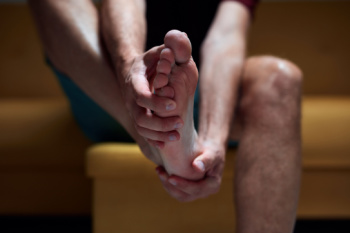
Plantar fasciitis involves inflammation of the thick band of tissue that runs along the bottom of the foot, connecting the heel to the toes. This tissue, called the plantar fascia, supports the arch and absorbs shock during movement. When it becomes irritated or strained, sharp heel pain can develop, especially during the first steps in the morning or after long periods of rest. This discomfort can make walking difficult and alter the natural gait, leading to further strain on the feet and legs. Factors that can worsen plantar fasciitis include standing for extended periods, wearing shoes with inadequate support, having flat feet or high arches, and engaging in repetitive activities. If you have heel pain, it is suggested that you promptly contact a podiatrist who can offer appropriate treatment solutions.
Plantar fasciitis can be very painful and inconvenient. If you are experiencing heel pain or symptoms of plantar fasciitis, contact one of our podiatrists from The Podiatry Center, PC. Our doctors can provide the care you need to keep you pain-free and on your feet.
What Is Plantar Fasciitis?
Plantar fasciitis is the inflammation of the thick band of tissue that runs along the bottom of your foot, known as the plantar fascia, and causes mild to severe heel pain.
What Causes Plantar Fasciitis?
- Excessive running
- Non-supportive shoes
- Overpronation
- Repeated stretching and tearing of the plantar fascia
How Can It Be Treated?
- Conservative measures – anti-inflammatories, ice packs, stretching exercises, physical therapy, orthotic devices
- Shockwave therapy – sound waves are sent to the affected area to facilitate healing and are usually used for chronic cases of plantar fasciitis
- Surgery – usually only used as a last resort when all else fails. The plantar fascia can be surgically detached from the heel
While very treatable, plantar fasciitis is definitely not something that should be ignored. Especially in severe cases, speaking to your doctor right away is highly recommended to avoid complications and severe heel pain. Your podiatrist can work with you to provide the appropriate treatment options tailored to your condition.
If you have any questions please feel free to contact our office located in Millburn, NJ . We offer the newest diagnostic and treatment technologies for all your foot and ankle needs.
Reminder: When Was the Last Time...?
More...
Foot Pain Caused by Cuboid Syndrome
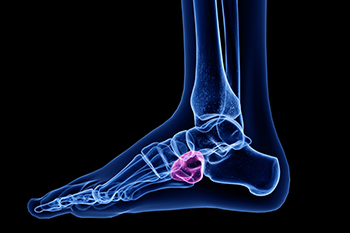
Cuboid syndrome is a type of foot pain that affects the outer middle part of the foot, where a small bone called the cuboid connects with the heel bone. This joint can become slightly out of place, often after an ankle sprain or repeated strain during activities like running, jumping, or dancing. The result is pain, swelling, and difficulty putting weight on the foot, especially during side-to-side movements or push-offs while walking. Some people develop a limp to avoid pressure on the painful area. Because the symptoms can feel like those of an ankle sprain, cuboid syndrome is often overlooked or mistaken for something else. Unfortunately, X-rays or scans do not necessarily show the problem, so a podiatrist conducts a physical exam and uses a patient’s description of how the injury happened. This can help to determine the cause in addition to recommending specific techniques or support to help relieve pain and improve motion. If you are experiencing midfoot pain that may be related to cuboid bone displacement, it is suggested that you schedule an appointment with a podiatrist for an exam, diagnosis, and appropriate treatment.
Cuboid syndrome, also known as cuboid subluxation, occurs when the joints and ligaments near the cuboid bone in the foot become torn. If you have cuboid syndrome, consult with one of our podiatrists from The Podiatry Center, PC. Our doctors will assess your condition and provide you with quality foot and ankle treatment.
Cuboid syndrome is a common cause of lateral foot pain, which is pain on the outside of the foot. The condition may happen suddenly due to an ankle sprain, or it may develop slowly overtime from repetitive tension through the bone and surrounding structures.
Causes
The most common causes of cuboid syndrome include:
- Injury – The most common cause of this ailment is an ankle sprain.
- Repetitive Strain – Tension placed through the peroneus longus muscle from repetitive activities such as jumping and running may cause excessive traction on the bone causing it to sublux.
- Altered Foot Biomechanics – Most people suffering from cuboid subluxation have flat feet.
Symptoms
A common symptom of cuboid syndrome is pain along the outside of the foot which can be felt in the ankle and toes. This pain may create walking difficulties and may cause those with the condition to walk with a limp.
Diagnosis
Diagnosis of cuboid syndrome is often difficult, and it is often misdiagnosed. X-rays, MRIs and CT scans often fail to properly show the cuboid subluxation. Although there isn’t a specific test used to diagnose cuboid syndrome, your podiatrist will usually check if pain is felt while pressing firmly on the cuboid bone of your foot.
Treatment
Just as the range of causes varies widely, so do treatments. Some more common treatments are ice therapy, rest, exercise, taping, and orthotics.
If you have any questions, please feel free to contact our office located in Millburn, NJ . We offer the newest diagnostic and treatment technologies for all your foot care needs.
Effective Stretches for Arch Pain Relief
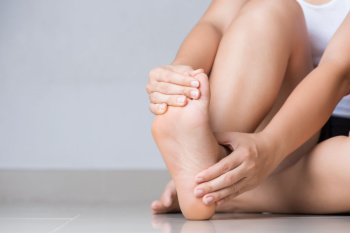
Arch pain can result from tight muscles, overuse, or conditions like plantar fasciitis. Stretching the feet helps improve flexibility, reduce tension, and promote better foot function. A simple stretch involves sitting and pulling the toes back toward the shin to lengthen the arch. Rolling a ball or frozen water bottle under the foot massages the area and eases tightness. Standing calf stretches also benefit the arch by loosening the Achilles tendon and lower leg muscles. Using a towel to gently pull the toes upward provides additional relief. Strengthening exercises, such as toe curls and picking up small objects with the toes, improve stability and support. Arch pain can cause difficulty in completing daily activities. If you have this foot condition, it is suggested that you consult a podiatrist who can determine what the cause is and offer treatment, which might include additional stretches for relief.
Stretching the feet is a great way to prevent injuries. If you have any concerns with your feet consult with one of our podiatrists from The Podiatry Center, PC. Our doctors will assess your condition and provide you with quality foot and ankle treatment.
Stretching the Feet
Stretching the muscles in the foot is an important part in any physical activity. Feet that are tight can lead to less flexibility and make you more prone to injury. One of the most common forms of foot pain, plantar fasciitis, can be stretched out to help ease the pain. Stretching can not only ease pain from plantar fasciitis but also prevent it as well. However, it is important to see a podiatrist first if stretching is right for you. Podiatrists can also recommend other ways to stretch your feet. Once you know whether stretching is right for you, here are some excellent stretches you can do.
- Using a foam roller or any cylindrical object (a water bottle or soda can will do), roll the object under your foot back and forth. You should also exert pressure on the object. Be sure to do this to both feet for a minute. Do this exercise three times each.
- Similar to the previous one, take a ball, such as a tennis ball, and roll it under your foot while seated and exert pressure on it.
- Grab a resistance band or towel and take a seat. If you are using a towel, fold it length wise. Next put either one between the ball of your foot and heel and pull with both hands on each side towards you. Hold this for 15 seconds and then switch feet. Do this three times for each foot.
- Finally hold your big toe while crossing one leg over the other. Pull the toe towards you and hold for 15 seconds. Once again do this three times per foot.
It is best to go easy when first stretching your foot and work your way up. If your foot starts hurting, stop exercising and ice and rest the foot. It is advised to then see a podiatrist for help.
If you have any questions, please feel free to contact our office located in Millburn, NJ . We offer the newest diagnostic and treatment technologies for all your foot care needs.
Why Live with Pain and Numbness in Your Feet?
Preventing Toenail Fungus
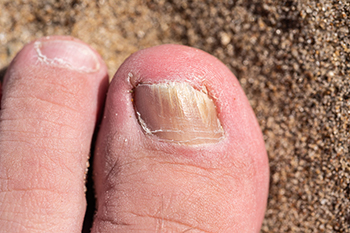
Toenail fungus, or onychomycosis, is a fungal infection that causes toenails to become discolored, thickened, brittle, or even separated from the nail bed. The infection often starts as a white or yellow spot under the tip of the nail, gradually spreading deeper. Symptoms may include a foul odor, pain, or discomfort while wearing shoes. Toenail fungus is typically caused by exposure to warm, moist environments, such as communal showers, around swimming pools, or tight, non-breathable shoes. People with a weakened immune system, diabetes, or poor circulation are more at risk of developing this condition. To prevent toenail fungus, it is essential to practice good foot hygiene by keeping your feet dry, wearing moisture-wicking socks, and choosing breathable shoes. Avoid walking barefoot in public spaces and regularly trim your nails straight across. A podiatrist can treat toenail fungus with antifungal medications or nail removal in severe cases. If you have the beginning symptoms of toenail fungus, it is suggested that you schedule an appointment with a podiatrist.
For more information about treatment, contact one of our podiatrists of The Podiatry Center, PC. Our doctors can provide the care you need to keep you pain-free and on your feet.
Toenail Fungus Treatment
Toenail fungus is a condition that affects many people and can be especially hard to get rid of. Fortunately, there are several methods to go about treating and avoiding it.
Antifungals & Deterrence
Oral antifungal medicine has been shown to be effective in many cases. It is important to consult with a podiatrist to determine the proper regiment for you, or potentially explore other options.
Applying foot powder on the feet and shoes helps keep the feet free of moisture and sweat.
Sandals or open toed shoes – Wearing these will allow air movement and help keep feet dry. They also expose your feet to light, which fungus cannot tolerate. Socks with moisture wicking material also help as well.
If you have any questions please feel free to contact our office located in Millburn, NJ . We offer the newest diagnostic tools and technology to treat your foot and ankle needs.
Blog Archives
- May 2025
- April 2025
- March 2025
- February 2025
- January 2025
- December 2024
- November 2024
- October 2024
- September 2024
- August 2024
- July 2024
- June 2024
- May 2024
- April 2024
- March 2024
- February 2024
- January 2024
- December 2023
- November 2023
- October 2023
- September 2023
- August 2023
- July 2023
- June 2023
- May 2023
- April 2023
- March 2023
- February 2023
- January 2023
- December 2022
- November 2022
- October 2022
- September 2022
- August 2022
- July 2022
- June 2022
- May 2022
- April 2022
- March 2022
- February 2022
- January 2022
- December 2021
- November 2021
- October 2021
- September 2021
- August 2021
- July 2021
- June 2021
- May 2021
- April 2021
- March 2021
- February 2021
- January 2021
- December 2020
- November 2020
- October 2020
- September 2020
- August 2020
- July 2020
- June 2020
- May 2020
- April 2020
- March 2020
- February 2020
- January 2020
- December 2019
- November 2019
- October 2019
- September 2019
- August 2019
- July 2019
- June 2019
- May 2019
- April 2019
- March 2019
- February 2019
- January 2019
- December 2018
- November 2018
- October 2018
- September 2018
- August 2018
- July 2018
- June 2018
- May 2018
- April 2018
- March 2018
- February 2018
- January 2018
- December 2017
- November 2017
- October 2017
- September 2017
- August 2017
- July 2017
- June 2017
- May 2017
- April 2017
- March 2017
- February 2017
- January 2017
- December 2016
- November 2016
- October 2016
- September 2016
- August 2016
- July 2016
- June 2016
- May 2016
- April 2016
- March 2016
- February 2016
- January 2016
- December 2015
- November 2015
- October 2015
- September 2015
- August 2015
- July 2015
- June 2015
- May 2015
- January 2014
- December 2013
- November 2013
- October 2013
- September 2013
- August 2013
- July 2013
- June 2013
- May 2013
- April 2013
- March 2013
- February 2013
- January 2013
- December 2012
- November 2012
- October 2012
- September 2012
- August 2012
- July 2012
- June 2012





